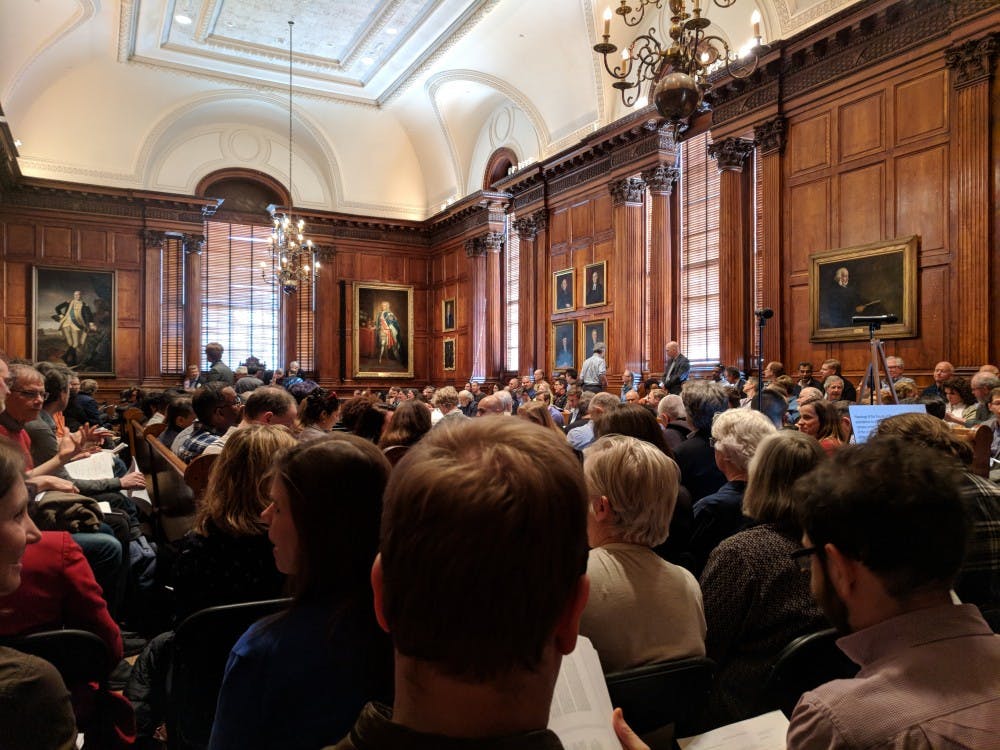University faculty voted to approve the proposal for calendar reform after much contention at a meeting on Monday.
“I was very inspired by the passion that all the faculty showed in this meeting,” Undergraduate Student Government president Rachel Yee ’19 said. “I think it’s very evident that a lot of our professors care about the well-being of their students.”
The new calendar will move fall exams to December and include a “Wintersession,” a flexible two-week space in January for students to engage in internships or independent work. A majority of the faculty raised their hands and said “aye” to the motion, and the reform’s passage was met with vigorous applause.
“Different departments, and indeed different individuals, have different needs across the calendar,” computer science professor Aarti Gupta said. “We have to balance these competing interests and then make choices.”
The faculty spent the better part of an hour debating the amendments.
“It was definitely a lot more contentious than I thought it would be,” Yee said. “I thought it would be a very simple couple of comments here and there, but it turned out to be pretty heated.”
Many of the protests against calendar reform came from faculty members concerned with having adequate time to conduct research before they have to begin preparing for classes, considering the new calendar would make the summer break begin a few days to a week earlier.
“For those of us who get a large percent of our research done over the summer months, that’s a not-so-insignificant cost,” philosophy professor Thomas Kelly said.
Kelly and other professors were skeptical of how effective Wintersession would be at providing a worthwhile experience for students.
“I worry that we’re a little bit overly optimistic about Wintersession,” Kelly said. “I think it’s quite difficult in practice to give undergraduates intellectually valuable experiences, and two weeks is not that much time to do that.”
Professor Elizabeth Harman, also of the philosophy department, argued that the current calendar is very helpful to faculty members with children, allowing them to get work and preparation done when their children go off to school. She also stated that Wintersession would have a negative effect on the faculty as well.
“[Wintersession] is a huge loss to faculty productivity,” Harman said. “Some of my colleagues are a little embarrassed to offer this as a reason because it seems selfish, but [the proposal] is just bizarre to me. We’re a serious research university; research is very important to us. We shouldn’t diminish it.”

In response to the protests, other professors remarked that the benefits for the students in the new calendar far outweighed the possible problems that could arise, especially when it came to lower-income students who are expected to come home for winter break, come back for January exams, and go home again.
“I think this is a serious disadvantage to many of our numerous new types of students that we’re trying to recruit to come to Princeton who are disadvantaged socioeconomically,” said molecular biology professor Elizabeth Gavis. “This is a huge imposition on them.”
Other professors noted that the vast majority of students support the changes to the calendar, which speaks to the necessity of reform.
“I would like to express my strong support in favor of the new calendar, which comes not so much from my personal opinions … but primarily from the overwhelming support I sense among our students,” said Athanassios Z. Panagiotopoulos, chair of the department of chemical and biological engineering. “I think we really need to talk a little bit more on that. If the advantages [of the current calendar] were so great, I would expect that to reflect in at least a significant fraction of the students being in favor of the current calendar.”
Dean of the College Jill Dolan took the stand briefly to confirm to her fellow faculty members that USG had officially endorsed the reforms and had found strong student support for them.
USG Academics calendar chair Olivia Ott ’20 echoed this.
“I was really excited to see it finally go through, and I feel great for students,” said Ott. “I think all the survey data we’ve done and most of the work we’ve done has shown that this was what students wanted to happen.”
Physics professor Steven Gubser suggested dividing the calendar reform discussion into two parts: having to do with Wintersession and not. The meeting stopped for a moment so President Christopher Eisgruber ’83 and others could deliberate on whether or not that could be done.
“I think there are really two things being proposed here: One is to move exams before Christmas, and the other is to establish Wintersession,” Gubser said. “I would like to see them treated differently because I think they require different levels of justification.”
The faculty voted on whether or not to divide the motion and rejected Gubser’s proposal, moving immediately to the vote.
The changes to the academic calendar will take place with the fall term of 2020, at the start of the 2020–21 academic year. Students in the Class of 2021 will be the first to experience the new schedule, in their senior year.
Additionally, during the meeting the valedictorian and salutatorian were announced for the Class of 2018: Kyle Berlin and Katie Lim, respectively.
Other items on the agenda were the proposal for an undergraduate certificate in journalism, proposed changes to the undergraduate curriculum in the Department of Chemical and Biological engineering and the graduate course catalogue, and the curriculum of several other graduate departments. All of these proposals were approved unanimously.
“I’m very proud of Princeton; I’m proud of the faculty for voting in favor of [calendar reform] overwhelmingly,” Yee said. “It was very clear that this is something that is much needed.”
The calendar revisions to the Rules and Procedures of the Faculty were developed by the Ad Hoc Committee on Calendar Reform, chaired by Gupta and staffed by Elizabeth Colagiuri, deputy dean of the college.
The meeting occurred at 4:30 p.m. in 1 Nassau Hall.








